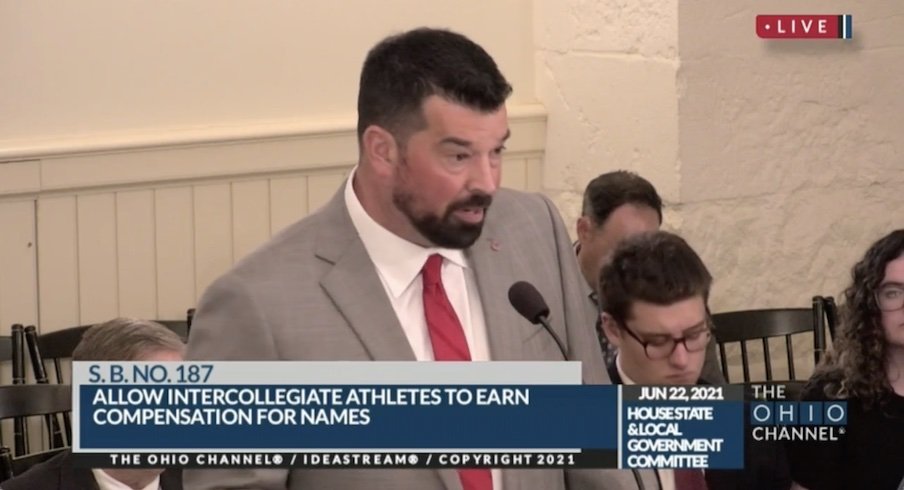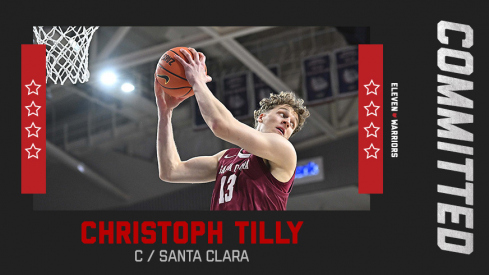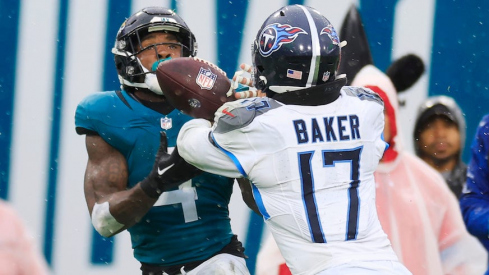Ryan Day didn’t mince his words.
The third-year Ohio State head coach, for the second time in seven days, left his football program’s ongoing high school camp in order to advocate for the passage of Senate Bill 187, which would allow college athletes in Ohio to profit off of their name, image and likeness. Athletic director Gene Smith, state senator Niraj Antani, former quarterback Cardale Jones and Schottenstein Real Estate Group president Brian Schottenstein joined him at the Ohio Statehouse, also testifying in favor of it passing.
If the bill isn’t signed within the next week-and-a-half, Day told the house state and local government committee on Tuesday afternoon that he believes the result could “possibly be a disaster” for Ohio State and other universities within the state.
“Because so many other states have or will enact legislation similar to Senate Bill 187, this has quickly become an issue for recruiting,” Day said as part of his opening statement to the committee. “If state legislation is not enacted, higher education institutions in Ohio will struggle to attract student-athletes who now can capitalize on their name, image and likeness elsewhere, including the state up north.”
The goal of Day, along with Antani who introduced the legislation, is to have it enacted by July 1. On that date, bills allowing college athletes to make money from their name, image and likeness will become effective in six states – Alabama, Florida, Georgia, Mississippi, New Mexico and Texas. Others, including Illinois, Iowa and Oregon, are also currently pushing to pass bills.
Ohio’s bill, which was introduced last month and passed the Senate with a 33-0 vote, must pass the House of Representatives before arriving on Governor Mike DeWine’s desk. To expedite the implementation of the legislation, Antani attached an emergency clause to the bill in order to waive the mandatory 90-day waiting period between when DeWine signs and when it becomes effective.
Day, speaking to the committee following Antani and Smith, expressed concern on multiple occasions about potential negative consequences of Ohio State’s ability to recruit and compete with other schools if this bill doesn’t pass.
“My biggest concern is that if we don't do it now and we don't enact the emergency clause, it's going to put our student-athletes, our teams at a competitive disadvantage, for sure, and create an unlevel playing field,” Day said. “I think it would be something that would leave a mark for a long time and (be) hard to come back from when you think about some of the other programs across the country. And it isn't just Division I or the football level, it's across the board in Ohio.
“If you think about someone being recruited right now, we have about 100 people in our building right now being recruited to come to Ohio State, and we have 120 football players on our team right now. In both cases, the people who are being recruited and then for our student-athletes right now, if they were to go to another state and have these opportunities to make money off their name, image and likeness but not here in the state of Ohio, it would quickly – and I only think it would take weeks – create a major problem and could possibly be a disaster.”
Day, like Smith, said he believes Congress has to pass legislation because “a patchwork approach to this issue will create an uneven set of standards.” However, as has been reported recently, there won’t be any federal laws passed by July 1.
Thus, Day believes, this bill will “keep our state and our athletes and our institutions on a level playing field” as long as the 50 states are addressing the NIL space individually without federal legislation in existence.
“This is important for every student-athlete in the state of Ohio in all sports, and it allows us to be on par with some of the other states and allows a level playing field across the state,” Day said.
In advocating for the bill, Day addressed several questions from committee members on Tuesday. Here were several of his answers:
- On how this would affect team culture: “I think that my time in the NFL gives me a little bit of experience of exactly what you're talking about. But like you said, it is real world. This is kind of life. I think that this is going to allow our student-athletes the opportunity to get ahead of a lot of this stuff where when some of our guys graduate from college, they're instantly into the world where they have to manage money, they have to deal with situations like this. This is just fast-forwarding that for three to four years based on when they graduate. So I think it's really great for them moving forward, and it prepares them more as they graduate to deal with these very situations – financial management but also real-world situations like this. So while it will be a challenge, I think it's something we have to talk about on the front end while we're recruiting people into our school and make sure that they understand that they're not coming here to make money; they're coming here to get a great education, be part of a program with an opportunity to win championships and better themselves, and this is something that's very separate to that. We will not be recruiting people into our program to make money. I think if the focus is on our culture and is on getting a great education at Ohio State, then I think we'll be better moving forward.”
- On the limitations of time impacting athletes’ ability to make money with other jobs: “I think it starts at an early age. I think when we see young people, and then obviously the people that we recruit to come to Ohio State, you see the sacrifices and the time that's made, even through high school, where maybe if they were into some sort of other endeavor they would be able to see the financial benefits down the road of it. The amount of sacrifices that are made going into high school, and once they're in college at our level and our team, the time commitment is tremendous. In season, we have a limit of 20 hours a week, but with that 20 hours, there's a lot of work done on their own watching film. What they do outside the building, there's still a part of that that requires focus and time commitments. In the offseason, the workouts, the lifting, it is a full-time job. And that starts in August when we start camp and goes year-round. We play all the way through into January. Once January hits, they go home for about a week. We come back and start school that first or second week in January. We start right up into workouts. We have spring practice. Spring practice leads right into the end of finals. Once finals hits, they get about a week or two off and then they head right into the summer sessions, and with summer sessions there's workouts, which we're in right now. Right in through July, and it starts in preseason. From year to year, they only have a couple weeks to actually even go home, forget have another job.”
- On if other sports have a similar time commitment: “There's 36 sports at Ohio State, and I'm very fortunate to be able to spend time with the tennis group, softball, many of the other sports, and have communication with their coaches. They're there early and they're there late, and their time commitment is just as much as football.”
- On whether Ohio State will gather best practices for NIL: “I think the communication that Gene Smith has provided for the athletic department in terms of best practices is something that we've used all along. Communication is something that we've done a lot of already in the athletic department and will continue to do so.”


